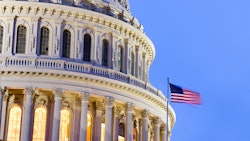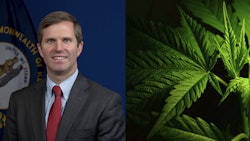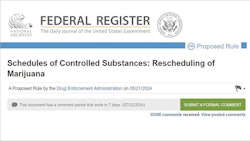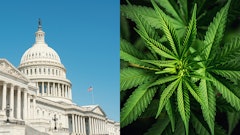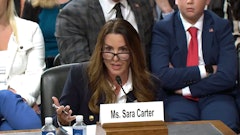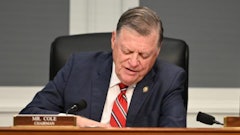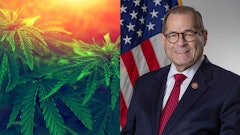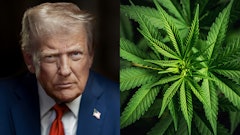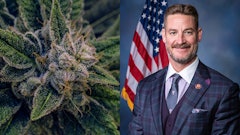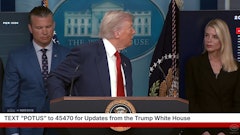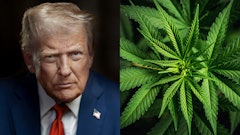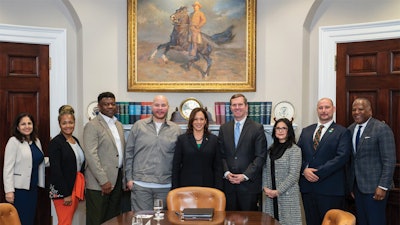
This article was originally published March 20, 2024.
The March 15 closed-door White House roundtable discussion on criminal justice reform—specifically focused on cannabis policy—left many wondering what took place during the meeting.
Vice President Kamala Harris, who convened the meeting, shared an opening statement (which was broadcast publicly) in which she called on the U.S. Drug Enforcement Administration (DEA) to act “as quickly as possible” on cannabis’s scheduling review and said cannabis’s Schedule I classification under the Controlled Substances Act is “absurd and patently unfair,” as Cannabis Business Times reported.
But following the vice president’s opening statement, media attendees were asked to leave, and the remainder of the meeting took place behind closed doors.
According to Chris Goldstein—a 25-year cannabis reform advocate and regional coordinator for nonprofit cannabis reform advocacy organization NORML who was one of eight people who remained in the Roosevelt Room where the roundtable discussion took place—Harris took her opening statement to a new level when she said to the small group of roundtable attendees, “I just need to say it, we need to legalize marijuana.”
In this interview with Goldstein—who was invited to the White House roundtable by Harris as one of three people who were pardoned by the Biden administration for federal cannabis offenses—he shares with Cannabis Business Times his experience being at the White House in the closed-door meeting and the stark contrast with darker days when he was arrested for cannabis possession. He also explains why he believes “that in the next eight months we either get federal marijuana legalization or something else happens,” and why he says, “I felt like I was watching the beginning of the end of the drug war happen right in front of my eyes.” (Specifically, eight months is a timeline that lines up with this November’s presidential election.)
Noelle Skodzinski: Will you tell us about your experience being invited to the White House for the roundtable discussion?
Chris Goldstein: I was invited by the vice president staff to talk about my pardon. I received a presidential pardon that … [the Biden administration] made a process for.
I was arrested during a protest in Philadelphia calling for descheduling 10 years ago, which was totally nerdy, like it was like the nerdiest marijuana protest ever.
I'm a Quaker. I know how to peacefully protest. This was a peaceful act of civil disobedience, and they sent 400 tactically armed police out there. … It is kind of astonishing.
Ten years ago this month, in March of 2014, a federal judge in Philly sentenced me to two years of supervised probation that would eventually include 40 drug tests, including at my house, and a $3,000 cash fine, and still a permanent criminal record.
But now descheduling is part and parcel of what we're talking about doing at the federal level, which is really cool.
I've been an activist for 25 years, and I've been talking about federal descheduling being the end game of prohibition literally that entire time. Everybody who works in this gets to figure that out, right? That if you want federal legalization, you're talking about removing marijuana from the Controlled Substances Act.
Skodzinski: Will you talk about your pardon and what you experienced Friday as a pardon recipient?
Goldstein: The pardon is good, but it doesn't clear your records. It's not an expungement. Only Congress can act to expunge records, even at the lowest level, like mine. So we're still waiting for that.
But I did put my pardon request in in March of 2023, and I received my pardon in January. And that's because the December proclamation by President Biden really covered it.
I really learned a lot on my trip, not just at the White House.
I learned that the presidential pardons cover more than possession and that they helped the Department of Justice expedite a backlog of marijuana clemency cases. … Michelle and Dexter, the two other people who were pardoned that were asked to speak with me at the White House about our experience—Michelle, who's from California, she had a case that wasn't possession. It was like a federal case. It really hurt her custody. And she had applied for an individual pardon.
I think we've been knocking President Biden and Vice President Harris for saying the pardons covered thousands of people. But I think they are accurate. The pardons are more wide-reaching than I think a lot of us realized.
And Noelle—I know this because I just did mine in March—they put a website up, and you put in your information, and I got my pardon in the mail. And that's how easy the process was. … But before they created the website and expedited the pardon process, you could apply for a pardon, but it was an individual process, and they sent FBI agents to your house to investigate you for the pardon. And a lot of people wouldn't apply because they didn't want the FBI coming to their house.
Skodzinski: What was the day like for you?
Goldstein: It was cool. I've never been invited to the White House before. It was definitely … well, do you watch Parks and Recreation?
Skodzinski: Yes. Not the first season, but the rest of it.
Goldstein: So I'm usually Ron Swanson, but I've turned into Leslie Knope by being invited to the White House. Seriously, I am Amy Poehler right now.
Getting invited by the White House is definitely a privilege and an honor and doing all this, going through the process of getting vetted by their staff and talking with everybody and meeting everybody there has been really fascinating.
And in my mind, I had this White House visit in my head, and I was prepared for it and all these things;
but what I wasn't prepared for was how immensely meaningful and emotional the visit to the Pardon Attorney's office was, [where the] people [are] who work on clemency at the Department of Justice. They brought all three of us to the office.
And there are 8-by-8 portraits on this wall, of inmates sketched by another inmate. And there are hundreds of them. And the art was so powerful.
… It was amazing. I'm like emotional thinking about it.
Then they gathered the whole staff, like 40 people, in this conference room and on this big zoom screen.
And they had us tell our stories to them because these are the people that worked on the whole project—the president made the pardons, but they had to make it happen, right?
And I held up my pardon to them, and I was like, “Look, people are going to look back at this as the first signal, like the white flag at the beginning of the end of the drug war. And you guys helped write that,” and everybody felt that it was so cool.
So anyway, the Pardon Attorney's office was awesome.
Skodzinski: Will you talk about the Biden administration’s move for pardons, and the difference versus expungement, as some have brought up the difference as a criticism of President Biden’s claims such as when he said at a Democratic dinner in February, “I [kept] my promises when I said no one—no one should be in prison for merely possessing marijuana or using it, and their records should be expunged. A promise made and a promise kept.”
Goldstein: Well, something's been done. Have they gotten their messaging wrong? Yes. OK, pardons are not expungements. But that doesn't take away from the fact that they've taken action.
We've correctly taken them to task for words they've gotten wrong, like expungements. Believe me, when I watched the State of the Union, I was just like, if the word was pardons, it would be accurate, and no one would have a problem with it. … But that word isn't right.
RELATED: Biden 1st President to Mention ‘Marijuana’ During SOTU Since Reagan
I absolutely think the president wants to clear records. I think that in his mind, like he keeps saying it, I'm sure he wants it to be true.
I think that their focus and what we saw on Friday was them looking to get things right. And they've gotten every executive action right. They're going in the right direction.
Skodzinski: What happened next?
Goldstein: The three of us and the pardon attorney and one of their staff went over in a car to the White House and … got checked into security. Then we got taken over to the vice president's official office, which is across from the White House in the Eisenhower Executive [Office] Building.
That's where we met everybody who was gonna be in the meeting. There were some people there who we were told would be there, and some people there who we were told would be there at the last minute, like Fat Joe, which was interesting, and the governor of Kentucky.
Cynthia Roseberry, who is with the ACLU, was also sitting at the table right across from me in the Roosevelt Room.
And when they said it was going to be in the Roosevelt Room, it was like, wow, the significance there is that Richard Nixon [named] the Roosevelt Room. And so that's also why they chose it.
It was amazing to be … sitting at the table with seven other people and to be one of the eight people at the table with the vice president. And she’s at the head of the table running the meeting.
So they had the press in, and you saw the section of it [that was broadcast live], and then they closed the doors.
Skodzinski: What were the key takeaways for you, and what do you think will come out of it?
Goldstein: Sitting across from me is Cynthia from the ACLU, and behind her is the gigantic portrait of Franklin Roosevelt sitting at his desk, looking out, old and optimistic, at us.
And then Vice President Harris raises her hands literally above her head and she says, “I just need to say it, we need to legalize marijuana.”
And she's saying that under the portrait of Teddy Roosevelt on his horse in the Roosevelt Room, the room that Nixon [named]. And that was not lost on any of us—that she had used that moment for the significance of everything.
And she was saying in the clearest terms, everything that we wanted to hear: “I just need to say it.
We need to legalize marijuana.”
Everybody’s asked me since, does she know the nuances of that? Yes. I'd assume, yeah.
She also took time in the meeting to talk about the DEA scheduling review. She also knows that rescheduling isn't the end game either, no matter what the DEA says.
And right now, they're leaning toward defending Schedule I.
(Editor’s note: Goldstein is referring to a March 9 Wall Street Journal article that reported “some counterparts within the Drug Enforcement Administration are resistant, saying the drug’s medicinal benefits remain unproven and that it has a high potential for abuse, people familiar with the matter said,” and that “Some agency officials also think more research is needed about marijuana’s long-term health effects.”)
I'm glad of that. Let the DEA be the DEA.
Right now, the HHS has recommended Schedule III. But if you really read the recommendation, … they actually make a better case for descheduling cannabis.
So I want to make it really clear that … Congress can deschedule cannabis.
I sat there in the Roosevelt Room, and on the table in front of me were two things: my pardon, I printed it out so everybody could see it, and a copy [that I brought] of the 1972 Schafer report [formal name: “Marihuana: a signal of misunderstanding; first report by U.S. Commission on Marihuana and Drug Abuse”].
That was a blue-ribbon presidential commission report done by the Nixon administration. And it's called the Schafer report because it's named after Raymond Schafer, the guy who ran the commission. That report recommended federal cannabis decriminalization and descheduling.
A blue-ribbon report doesn't expire and, well, any White House can act upon it.
What I saw that day is that I think everybody's been seeing the scheduling review and the response from the DEA as the end game; but I really think it's just due diligence here. The White House is checking off the list, getting ready to make more decisive action.
So they have the 1972 report. So if anybody says, “Oh we need to do a study,” no problem. Done.
If anybody says, “Oh, did you do a scheduling review?” Done—even if the DEA onerously doesn't answer or tries to draw out the clock.
And then they've done the engagement round by inviting us into the Roosevelt Room. …
So I believe that this has been strategic.
And the other real key that I took away from it is that it was surprisingly more expansive than marijuana in that they seem that the marijuana-legalization component is the short-term game. That's what they want to get done.
Now the next four years is getting to everything else with the drug war.
Skodzinski: What’s the significance of this for you and other advocates for cannabis policy reform, and what do you see as still needed?
Goldstein: We've asked every White House since Nixon to take action, and nobody has until the Biden administration. They've done more in two years to advance federal marijuana reform than Congress has in 50. And Congress hasn't done anything—only 27 bills passed last year.
Any of these incremental-change bills, look, voters are beyond incremental change.
In New Jersey, … you wouldn't have asked us [on the ballot initiative] to move things into Schedule III, that wouldn't have flown here. Come on. Voters have already legalized marijuana.
What do you give us next at the federal level? You have to give us legalized marijuana. Not any incrementalism.
Now, Noelle, what's important is that in New Jersey, I was in this fight here and the legislature did not pay attention for years and years and years. But 3 million voters come to the polls and [the government is] literally legally compelled to act.
What's important about descheduling is that it doesn't need to be wrapped up into a bigger bill. … Congress could just deschedule cannabis on its own and, like voters, compel state legislatures to act.
But if you can compel a legislature through action … and then pass a flight of bills, we've just legalized marijuana nationwide.
And I think we're right there. I think we're right there.
Skodzinski: So you think that descheduling is the end game of the administration?
Goldstein: I think it a seriously clear pact with the American people that in the next eight months we either get federal marijuana legalization or something else happens.
I think that there's a quid pro quo with the American public here. I think that in the nature of prohibition, we have been fed a lot of promises, so anything less than delivering won't fly. And they brought me in there [to the meeting] because I'm the guy who says that already.
So they're there to tell me what's up. And I understood that. I understood. I heard everything the vice president said. She put pressure on the DEA. She said, “legalize marijuana,” and she addressed her own record. And she said let's pivot to bigger drug war issues and let's work on clemency.
It covered my entire list.
And having Vice President Harris personally thank me for my activism and advocacy extends to our entire community. … And they brought me in there to thank all of us.
We could not really ask for better out of a presidential administration. They're showing real engagement here.
We, as a community, need to learn to understand when we're winning just as much as when we're fighting to win.
I felt like I was watching the beginning of the end of the drug war happen right in front of my eyes.
Editor’s note: This interview has been edited for style, length and clarity. Since this was a closed-door White House discussion, CBT can’t confirm the vice president’s remarks. CBT reached out to the White House for comment.











